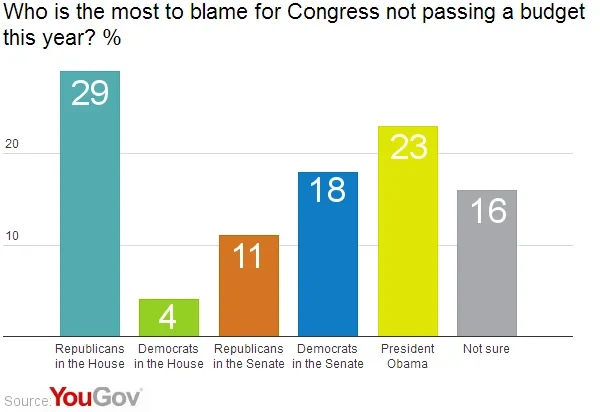Most Americans don't think the Congress will actually be able to pass a budget, while the Congressional GOP has lower favorability ratings than their Democratic counterparts.
As the House of Representatives prepares to finish up its 2013 session on Friday, Democratic Senator Patty Murray and Republican Representative Paul Ryan have unveiled a compromise budget, attempting to avoid yet more endless debate and government shutdown threats next year. While they are hopeful the budget can pass the House by Friday and the Senate sometime next week, a success will surprise the American people.
The latest Economist/YouGov Poll indicates that Americans don’t expect a budget to pass this year – or next – and many say the government itself is simply broken.
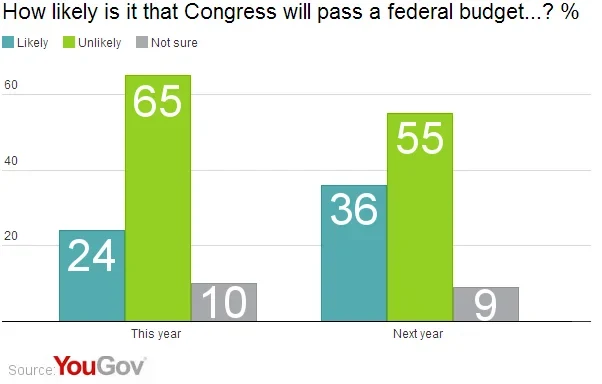
Only 24% say passing a budget this year is even somewhat likely, and both Republicans and Democrats are skeptical. 36% think there will be a budget next year, and Democrats are somewhat more hopeful than Republicans about that.
But the problem, according to most Americans, may be Congress itself. In this week’s poll, just 7% say they approve of the way Congress is handling its job. 73% disapprove. The 7% approval mark is only one point about the all-time low for Congress; this week’s disapproval figure is only one point lower than the highest disapproval rating for Congress in Economist/YouGov Polls.
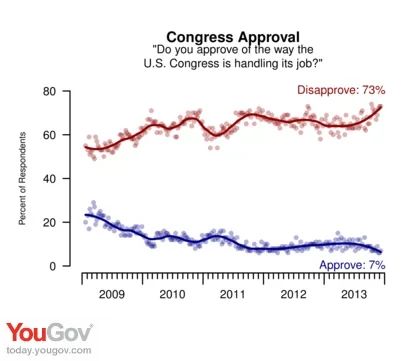
And the disapproval extends to both sides of the aisle, and is even stronger among political independents (86% of them disapprove of Congress). But Americans seem to reserve their greatest annoyance for Republicans in Congress. 58% have unfavorable views of the Congressional Democrats, 66% unfavorable opinions of the Congressional GOP. And House Democratic Minority Leader Nancy Pelosi, who at one time may have been the most unpopular Member of Congress, now takes a back seat to current Speaker John Boehner when it comes to unpopularity.
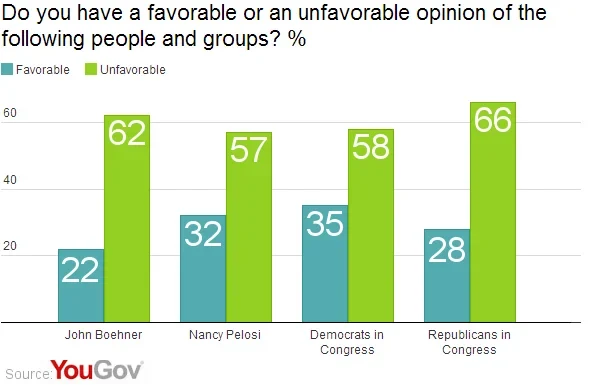
Independents rank the two Congressional parties similarly: more than two in three have unfavorable views of both parties. Like the country overall, they dislike Boehner more than they do Pelosi.
However, when Americans are asked to name the worst Speaker of the House in recent years, Pelosi comes out on top – but that’s because she is by far the best remembered Democratic Speaker of the last 30 years. Hardly any adults select her Democratic predecessors, like Tip O’Neill (1977-1986), Jim Wright (1987-1989) or Tom Foley (1989-1994) when asked to name the worst Speaker.
But Republicans have two claimants on that position: Newt Gingrich, who led the House between 1995 and 1998, and Boehner. Combined, just about as many select the two Republicans as the worst recent Speaker as pick Pelosi.
But Gingrich and Pelosi get more votes than Boehner when it comes to naming the best Speaker since 1980. Only 6% select Boehner, while nearly a third choose either Pelosi or Tip O’Neill. One in four pick Gingrich.
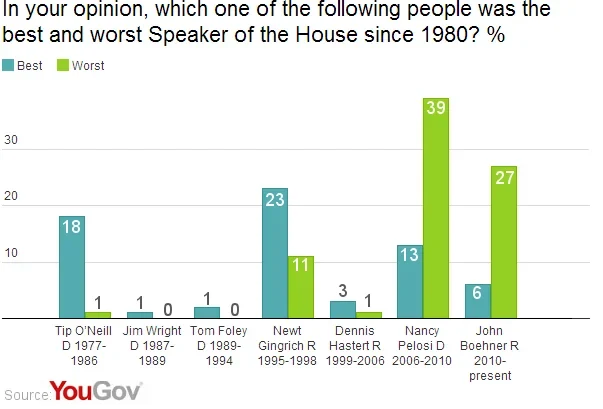
It’s been a bad year for Congress: more than two-thirds of the country say Congress has accomplished less this year than usual at this point in its two-year term. In recent years, Americans have tended to say Congress has done less and less. 58% thought Congress had done less than usual two years ago, at the end of 2011. And there is a lot of blame to go around. Those who say Congress has accomplished less than usual are more likely to blame Republicans than Democrats for that, although a third put the blame on both parties equally.
In fact, 80% say Washington is broken – and unlikely to be fixed anytime soon. Just 7% think President Obama can fix the problems in Washington, and only 13% think the current Congress can. Most Americans say they the current President and the current Congress can’t.
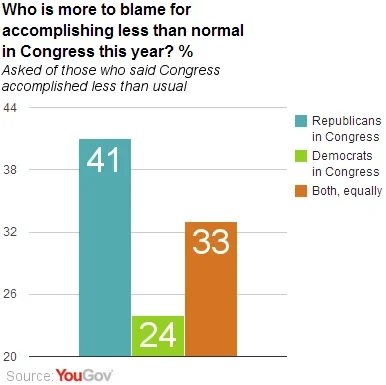
There is a little more hope for the future, but not much. Many aren’t sure whether or not a future Congress or President can fix things. Republicans have more hope than Democrats that the next President will fix what is broken – and they also are probably hoping that next President will be a Republican. Republicans are also more hopeful that the next Congress will fix things.
Right now the concern is getting a budget. And – as they have for years – Americans want that budget to be balanced. Many think of the federal budget as they do their own pocketbooks, where deficit financing is not an option:
- 56% would support a Balanced Budget Amendment, requiring the budget be balanced – and a three-fifths majority to raise the debt ceiling.
- 41% want the budget balanced immediately; a majority want it done by at least next year.
- More than three in four are concerned about the deficit’s size.
- 63% want the government to decrease spending
It’s not just Congress that is the problem. The President also comes under fire for the current state of the deficit, too: six in ten overall give him at least some blame – and so do more than a third of Democrats. Just over a third approves of how President Obama is handling the federal budget deficit; 56% disapprove.
But Congress gets more blame – although 23% say Barack Obama is the most responsible for a budget not being passed so far this year, more than half put the blame somewhere in Congress – on Republicans more than Democrats, but on both Houses about equally.
